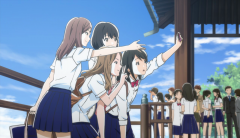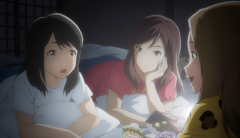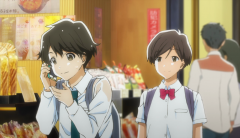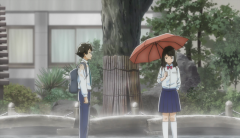I’m totally impressed with Tsuki ga Kirei thus far. This show has its own voice and after this episode I’m confident that we will have the constant quality in display for the rest of its run. Nothing can beat consistency, I assure you. This week, the kids go to another city for a school trip and it’s…wait a minute…Kyoto. Within the first few shots of the city I could easily recognize that favorite town of mine (if you ask me how much I love Kyoto, let just say it’s THE city that I wanna live in. And I might). I’m digging it how the show handles the aftermath of the confession last week: take it slow and give it some more thoughts. Her delayed response really is the most natural decision come from Akane and it might be her best decision, at that stage when she isn’t sure if she’s romantically interested to Kotarou (whether she has a crush on Kotarou, yes, but how many crushes you have back in school life? Once every few months right?). Remember that she doesn’t deny when her friends ask her if the boy she’s interested in was Takumi. Chinatsu, on the other hand, plays off her role as a romantic rivalry, though there was never any romance to begin with, and actively assists the duo. I love that behind her cheerful and out-there personality, she reads the situation so spot-on; and she handles the situation effortlessly. Minor issues that both Kotarou and Akane would find to awkwardly to address, she brushes it off with ease. Such a good characterization for a character who doesn’t have much screen-time. Bravo!
While the romance aspect is this episode’s main focus, the slice of life part really brings the calm, grounded and bright atmosphere to Tsuki ga Kirei. The school trip plays out exactly like any regular school trips, with great details to the settings, and to the small activities of the students. There’s this group of girls taking selfie, the other group playing cards, most of them would skip early bedtime for playing around and talking romantic stuffs. In this world, all the surrounding characters feels breathable (for the lack of better word) in the environments around them. Both Kotarou’s friends and Akane’s friends are highlighted not by their distinctive traits, nor by their development, but by their everyday interactions with the world around them and their own self-position towards that world. Hands up for Aira (one of Akane’s friend) for giving her some space that most of the kids that age ain’t sensitive enough to realize. Again, this show’s characterization is top-notch.
The episode also highlights the anxiety of our Kotarou and Akane towards their newfound relationship (or the lack thereof) and it’s as honest and awkward as it might get. They’re afraid to talk to each other, but always aware of other’s whereabouts (man, so true!). Kotarou’s nervousness of texting the girl and then has his phone taken by the teacher in the process are nicely played out before the climax. And when the climax kicks in, the tone, the pacing and the whole execution were incredible. He’s late to meet her, he doesn’t respond her phone, he shows up in poor, soaked state: all the conditions that could make any girl mad, although we’re in his shoes so we know he deserved better. I understand both the frustration of Akane and the helplessness of Kotarou. He even doesn’t try to justify himself, which make me hold him in higher regard. Akane’s response later perfectly leads the show into the right direction and closes the episode on a high note. She just wants to talk to him more. Usually other romantic anime speed up this process (and to be fair, even in real life), but unless she knows more about him, unless she spends some more time with him, she wouldn’t know if she really likes him.
I was initially considering about the combo of Tsuki ga Kirei – Scum’s Wish for portraying both spectrum of teenager’s romance, but now I’m leaning towards this one – Flowers of Evil double series for addressing contrasted sides of growing up. They’re both set in adolescent phase, when most of them are still unsure about themselves. While Flowers of Evil leans on its dark side that tackle on obsessions, youth-frustration and identity; Tsuki ga Kirei is pure white that focus on the brightest side of first crush and self-grown, and friendship. That not to say this one isn’t complex, far from it, because Tsuki ga Kirei tackles such seemingly simple premise with keen eye for details and a deep understanding of growing up process. It’s simple, true, but it’s the kind of “simple” that isn’t easily obtained.




